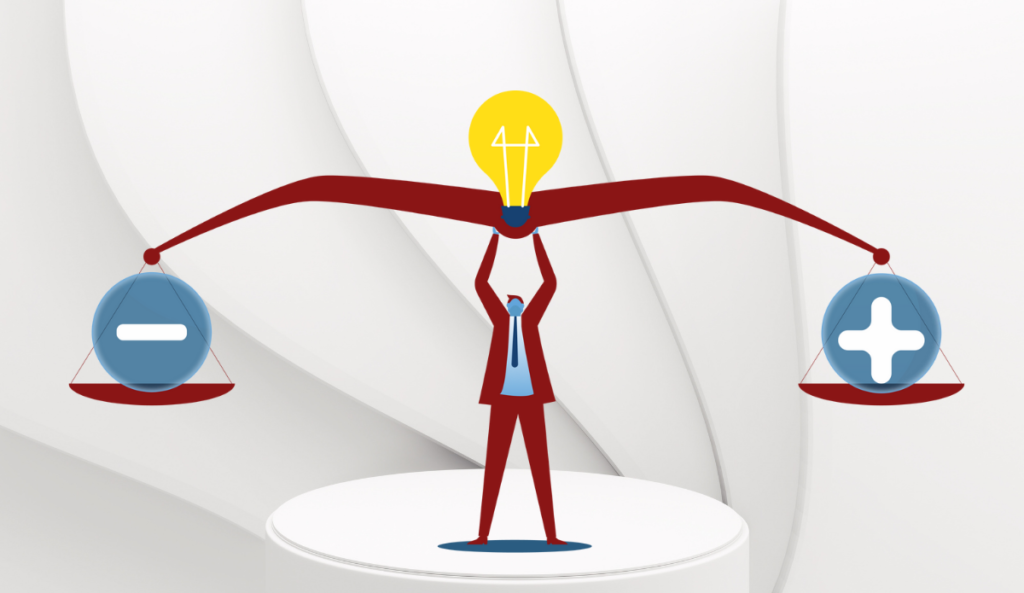A strong mindset is an essential aspect of personal and professional success. It is the foundation upon which individuals build resilience, overcome challenges, and achieve their goals. A strong mindset enables individuals to see opportunities instead of obstacles, to focus on solutions instead of problems, and to keep moving forward despite setbacks and failures.
In this article, we will explore in-depth the six key characteristics of a strong mindset, along with some practical tips and strategies for developing them.

Table of Contents
1. You generally Move On without Wasting Time being Sad
One of the most important characteristics of a strong mindset is the ability to bounce back quickly from setbacks and failures. It is natural to feel disappointed, sad, or frustrated when things don’t go as planned, but individuals with a strong mindset do not dwell on negative emotions for too long. They acknowledge their feelings, process them, and then move on.
When individuals spend too much time dwelling on negative emotions, it can drain their energy, motivation, and focus, which can impede their ability to take action and move forward. By contrast, individuals with a strong mindset understand that setbacks and failures are an inevitable part of the learning process, and that the best way to overcome them is to keep moving forward.
Tips for Developing a Resilient Mindset:
- Practice self-compassion: Be kind to yourself and acknowledge that setbacks and failures are a natural part of the learning process.
- Reframe your perspective: Instead of seeing setbacks and failures as roadblocks, view them as opportunities to learn and grow.
- Take action: Set small, achievable goals and take action towards them every day, even if you don’t feel motivated or inspired.
FAQs:
Q: How can I stop dwelling on negative emotions and move on quickly from setbacks?
A: One effective strategy is to practice mindfulness meditation, which can help you cultivate greater awareness and acceptance of your thoughts and emotions. By learning to observe your thoughts and emotions without judgment, you can develop a more objective and compassionate perspective, which can help you move on more quickly from setbacks and failures.
Q: What if I keep experiencing setbacks and failures? How can I maintain a resilient mindset?
A: Remember that setbacks and failures are a natural part of the learning process, and that even the most successful individuals have experienced setbacks and failures along the way. It’s important to view setbacks and failures as opportunities to learn and grow, and to use them as motivation to keep moving forward.
2. Changes and Challenges are Easily Acceptable by You
Another essential characteristic of a strong mindset is the ability to embrace change and challenges with enthusiasm and curiosity. Change can be uncomfortable and challenging, but it is also necessary for growth and progress. Individuals with a strong mindset understand this and are willing to take risks and try new things, even if it means stepping outside of their comfort zones.
Similarly, individuals with a strong mindset do not shy away from challenges. They understand that challenges are opportunities to learn, grow, and develop new skills. Rather than being intimidated or discouraged by challenges, individuals with a strong mindset view them as opportunities to push themselves beyond their limits and to achieve new levels of success.
Tips for Embracing Change and Challenges:
- Reframe your perspective: Instead of viewing change and challenges as threats, view them as opportunities for growth and development.
- Set realistic goals: Break down big, intimidating challenges into smaller, more manageable goals, and focus on taking action towards those goals every day.
- Seek feedback: Ask for feedback from others, and use it as an opportunity to learn and improve.
FAQ:
Q: How can I develop a growth mindset and embrace change more easily?
A: Developing a growth mindset requires a shift in perspective from viewing challenges and setbacks as threats to viewing them as opportunities for growth and learning. Here are some practical strategies for developing a growth mindset:
- Practice self-reflection: Take time to reflect on your beliefs and assumptions about your abilities and potential. Challenge any negative or limiting beliefs, and reframe them in a more positive and growth-oriented way.
- Cultivate a learning mindset: Seek out new experiences and opportunities for learning and growth. Be open to feedback and criticism, and use it as an opportunity to improve and develop new skills.
- Embrace discomfort: Recognize that growth and learning often involve discomfort and uncertainty. Be willing to step outside of your comfort zone and take risks, even if it means making mistakes and experiencing setbacks.
3. You Like to Stay Happy and accept that you cannot Control Everything
Another key characteristic of a strong mindset is the ability to maintain a positive and optimistic outlook, even in the face of challenges and uncertainty. Individuals with a strong mindset understand that happiness is a choice, and that they have the power to control their thoughts and emotions.
At the same time, individuals with a strong mindset also recognize the limits of their control. They understand that there are many things in life that are outside of their control, and that the best they can do is focus on what they can control and let go of what they cannot.
Tips for Maintaining a Positive Outlook:
- Practice gratitude: Take time each day to reflect on the things you are grateful for. This can help you maintain a positive perspective and reduce stress and anxiety.
- Focus on what you can control: Identify the things in your life that you have control over, and focus your energy and attention on those things.
- Let go of what you cannot control: Recognize that there are many things in life that are outside of your control, and let go of any attachment or anxiety around them.
FAQs:
Q: How can I maintain a positive outlook when things are challenging or uncertain?
A: One effective strategy is to focus on the things that you can control, and let go of the things that you cannot. By focusing on what you can control, such as your thoughts, emotions, and actions, you can maintain a sense of agency and purpose, even in difficult circumstances.
Q: What if I struggle to let go of things that are outside of my control?
A: Letting go of things that are outside of your control can be challenging, but it is an essential part of maintaining a positive and resilient mindset. One strategy is to practice mindfulness meditation, which can help you cultivate greater awareness and acceptance of your thoughts and emotions. By learning to observe your thoughts and emotions without judgment, you can develop a more objective and compassionate perspective, which can help you let go of attachment and anxiety around things that are outside of your control.
4. You’re Kind, Fair, and Fearless to Take a Stand
Individuals with a strong mindset are also characterized by their sense of integrity, fairness, and courage. They are not afraid to stand up for what they believe in, even in the face of opposition or criticism.
At the same time, individuals with a strong mindset are also kind and compassionate towards others. They understand the importance of empathy and connection, and they seek to build positive relationships and foster a sense of community.
Tips for Developing Integrity and Courage:
- Define your values: Take time to identify the values that are most important to you, and use them as a guide for your thoughts and actions.
- Speak up: Be willing to speak up for what you believe in, even if it means taking a stand that is unpopular or controversial.
- Practice empathy: Seek to understand others and show compassion towards their perspectives and experiences. This can help build trust and positive relationships, even in challenging situations.
FAQs:
Q: How can I develop the courage to speak up for what I believe in?
A: Developing courage requires a willingness to face fear and discomfort. One effective strategy is to start small, by speaking up in situations that feel relatively low-risk. As you build confidence and experience, you can gradually take on more challenging situations and develop greater courage and resilience.
Q: How can I balance my desire to stand up for my beliefs with my need to maintain positive relationships with others?
A: Balancing the desire to stand up for your beliefs with the need to maintain positive relationships can be challenging. One strategy is to focus on building empathy and understanding towards others, even if you disagree with their perspectives. This can help foster positive relationships and open up opportunities for dialogue and growth.
5. Calculated Risks can be taken by You
Individuals with a strong mindset are not afraid to take risks and pursue new opportunities, but they do so in a calculated and thoughtful way. They understand that taking risks is essential for growth and learning, but they also recognize the importance of balancing risk with reward.
Tips for Taking Calculated Risks:
- Identify your goals: Take time to clarify your goals and objectives, and use them as a guide for your decision-making.
- Weigh the pros and cons: Before making a decision, take time to evaluate the potential risks and rewards. Consider the potential outcomes, and weigh the costs and benefits.
- Be prepared for setbacks: Recognize that taking risks involves the potential for setbacks and failures. Be prepared to learn from your mistakes and use them as opportunities for growth and improvement.
FAQs:
Q: How can I overcome fear and uncertainty when taking risks?
A: Overcoming fear and uncertainty requires a willingness to embrace discomfort and uncertainty. One effective strategy is to focus on the potential rewards of taking a risk, rather than the potential costs. By focusing on the potential benefits, you can build confidence and motivation to take action, even in the face of fear or uncertainty.
Q: What if I make a mistake or experience a setback?
A: Mistakes and setbacks are a natural part of taking risks and pursuing new opportunities. The key is to use them as opportunities for learning and growth. Take time to reflect on what went wrong, and identify areas for improvement. Use the experience as an opportunity to develop resilience and improve your decision-making skills.
6. Other’s Success does not Threaten you, you rather Celebrate Other’s Success
Individuals with a strong mindset are not threatened by the success of others. Instead, they celebrate the achievements of others and use them as a source of inspiration and motivation.
Tips for Celebrating the Success of Others:
- Cultivate gratitude: Take time to reflect on the things you are grateful for, including the achievements and successes of others.
- Embrace collaboration: Seek out opportunities to collaborate and work together with others towards shared goals and objectives.
- Practice humility: Recognize that success is often the result of a combination of hard work, talent, and luck. Be humble and gracious towards others, and use their success as an opportunity to learn and grow.
FAQs:
Q: How can I overcome feelings of jealousy or competition towards others?
A: Overcoming feelings of jealousy or competition requires a shift in perspective from viewing others’ success as a threat to viewing it as an opportunity for growth and collaboration. One effective strategy is to focus on your own strengths and goals, and use the success of others as a source of inspiration and motivation. By cultivating gratitude and humility, you can build a more positive and collaborative mindset towards others’ success.
Q: What are some ways to celebrate the success of others?
A: Celebrating the success of others can take many forms, depending on the situation and context. Some ways to celebrate the success of others include:
- Offer congratulations: Reach out to the person and offer sincere congratulations on their achievement.
- Share their success: Spread the word about their achievement to others, through social media or word of mouth.
- Learn from their success: Take time to reflect on what you can learn from their success, and how you can apply it to your own goals and aspirations.
- Collaborate: Seek out opportunities to collaborate with the person, whether on future projects or in other areas of mutual interest.
- Show appreciation: Take time to express your appreciation for the person’s hard work and dedication, and how it has benefited you or others.
Conclusion
Developing a strong mindset is essential for achieving success and fulfillment in life. By cultivating traits such as resilience, adaptability, gratitude, courage, and collaboration, individuals can build a more positive and empowering mindset that can help them overcome challenges and pursue their goals with greater confidence and purpose.
While developing a strong mindset may require effort and practice, it is a worthwhile investment in oneself and one’s future. By building a foundation of resilience and positivity, individuals can not only achieve their own success but also inspire and uplift others around them.


